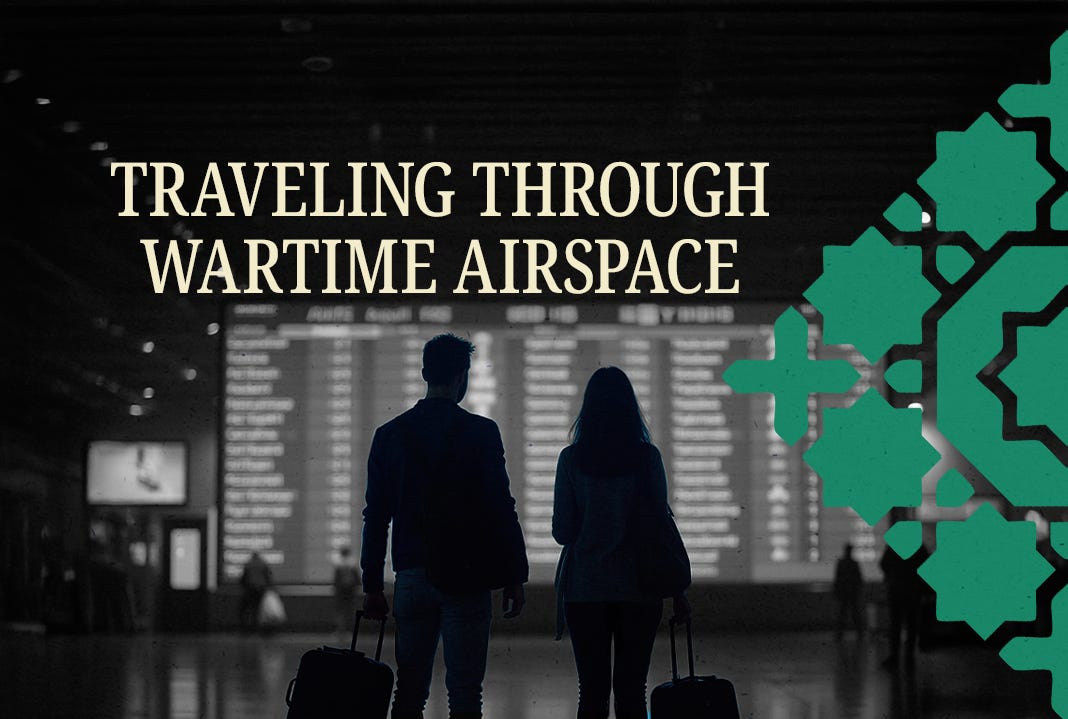Traveling Through Wartime Airspace
As regional powers exchanged fire, civilian aviation became a casualty of geopolitical risk as one couple attempted to find their way home.
In early June, my husband and I set out on what we thought would be an uneventful vacation to Sri Lanka. But by the time we packed our bags to return, the region was spiraling into conflict. On June 13, Israel launched a surprise strike on Iranian nuclear and military infrastructure, triggering Operation Rising Lion. Iran retaliated almost immediately. Within hours, a new Middle Eastern war was underway, and with it, the skies began to close.
Many countries, Iraq among them, closed their airspace, cutting off critical east-west transit corridors and plunging commercial aviation into chaos. Our flight home to Iraq was canceled. Like thousands of others, we found ourselves stranded in Colombo, Sri Lanka, at the mercy of diplomatic alerts, grounded flights, and rapidly deteriorating regional alliances.
The travel disruption was inconvenient for us. But for Iraq, a nation frequently pulled into regional conflicts, it was catastrophic. Baghdad preemptively closed its airspace to avoid becoming a staging ground or accidental target in the crossfire. In doing so, it froze more than 700 daily overflights, costing the country an estimated $250,000 to $270,000 per day in lost transit fees.
The economic blow extended far beyond airspace revenues. Flights were rerouted over Saudi Arabia, Turkey, and Central Asia, resulting in increased fuel costs and longer flight times of several hours. Domestic airports sat idle, and Iraqi citizens abroad, including my husband and I, struggled to get home.
So, we had to improvise, applying for a security permit to fly into Jordan and exploring alternative routes that could bring us closer to home.
With conflicting guidance from consulates and airlines, even basic updates required persistence. A routine return flight had morphed into a high-stakes jigsaw puzzle.
What unsettled us most wasn’t the bureaucratic nightmare. It was the realization that our ordeal, however frustrating, was small in comparison to the widespread suffering unfolding around us. Civilians were dying. The threat of war crossing into Iraq frightened us. Each day, the war in the air translated into tragedies on the ground.
The lines between war and peace, civilian and combatant, traveler and refugee, blurred in painful ways. It reminded us that our situation was small relative to the broader fallout.
We quickly realized the need to find moments of levity as the days went on. In the middle of our makeshift travel war-room, surrounded by spreadsheets of alternate routes and boarding alerts, we started calling the airport lounge our “beachfront resort.” Strangers bonded over absurd delays and shared power outlets. Humor helped us through it.
We finally crossed into Iraq on June 22. At the border checkpoint, we were able to breathe a sigh of relief. We were home. The familiar hum of Iraq—the traffic, the street vendors, even the heat—offered a strange but welcome relief.
But the experience left us changed. What once felt like ordinary travel now seems like a precarious privilege. The infrastructure of peace—open airways, trusted visas, commercial predictability—is far more fragile than it appears. We won’t take it for granted any time soon.
As of this writing, the June 24 cease-fire seems to be holding. But few believe it marks the end of hostilities. International and regional actors continue to pressure toward de-escalation, while airlines adopt more conservative risk models, steering clear of any possible missile range.
Iraq’s aviation sector may take some time to compensate for the loss of revenues during the war.
We’re home now. But the experience stays with us and reminds us that in a globalized world, regional wars don’t stay regional for long. They reverberate through supply chains, economies, and the lives of ordinary citizens who didn’t ask for conflict. And they can ground us, quite literally, in ways we never anticipated.
Middle East Uncovered is powered by Ideas Beyond Borders. The views expressed in Middle East Uncovered are those of the authors and do not necessarily reflect the views of Ideas Beyond Borders.




